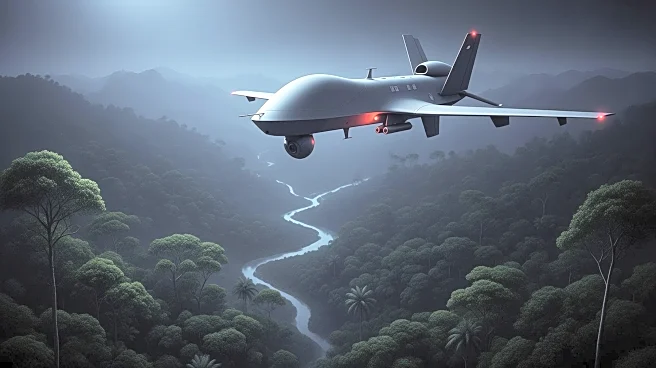What's Happening?
The United States has initiated Operation Southern Spear, a military campaign aimed at disrupting narcotics trafficking networks in the Western Hemisphere, particularly those linked to Venezuela. This
operation, led by Joint Task Force Southern Spear and SOUTHCOM, involves a significant deployment of U.S. military assets, including the Gerald R. Ford Carrier Strike Group and Air Force B-52 bombers. The operation follows direct orders from President Trump and is designed to exert pressure on Venezuelan President Nicolás Maduro's government, which is accused of facilitating large-scale narcotics trafficking. The U.S. Department of Defense has released images showing the coordination of warships, destroyers, and carrier-based aircraft near Venezuela, highlighting the escalating U.S. military presence in the region.
Why It's Important?
Operation Southern Spear represents one of the most extensive U.S. regional security initiatives in recent years, significantly increasing pressure on the Maduro regime. The deployment of approximately 10,000 U.S. troops across South America and the Caribbean, supported by advanced military hardware, underscores the seriousness of Washington's commitment to counter-narcotics operations. This initiative could reshape diplomatic relationships and economic ties throughout Latin America, as the U.S. considers potential military actions within Venezuela. The operation's focus on narco-terrorist threats, such as Tren de Aragua and Cartel de los Soles, may provide legal grounds for expanding U.S. operations beyond maritime interdiction, signaling a more assertive regional approach.
What's Next?
The potential for direct U.S. strikes in Venezuela could redefine regional security dynamics, affecting diplomacy, trade, and border stability across the Americas. As Operation Southern Spear progresses, Washington's actions will be closely monitored by allies and adversaries alike, with global observers assessing the impact on U.S. policy in the hemisphere. Venezuela has mobilized its military and civilian forces in response, preparing for possible U.S. attacks. The situation remains tense, with the U.S.-backed opposition in Venezuela renewing calls for regime change.
Beyond the Headlines
The operation raises ethical and legal questions regarding the use of military force in counter-narcotics operations and the potential consequences for civilian populations in affected areas. The designation of Venezuelan groups as narco-terrorist threats could lead to broader military engagements, challenging international norms and potentially escalating regional conflicts. The long-term implications for U.S.-Latin American relations and the stability of the region remain uncertain.









